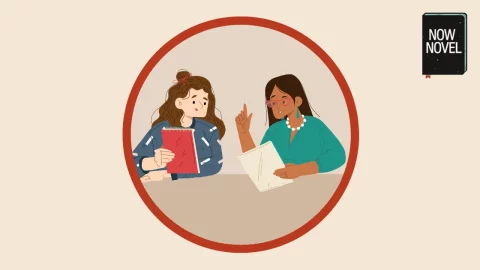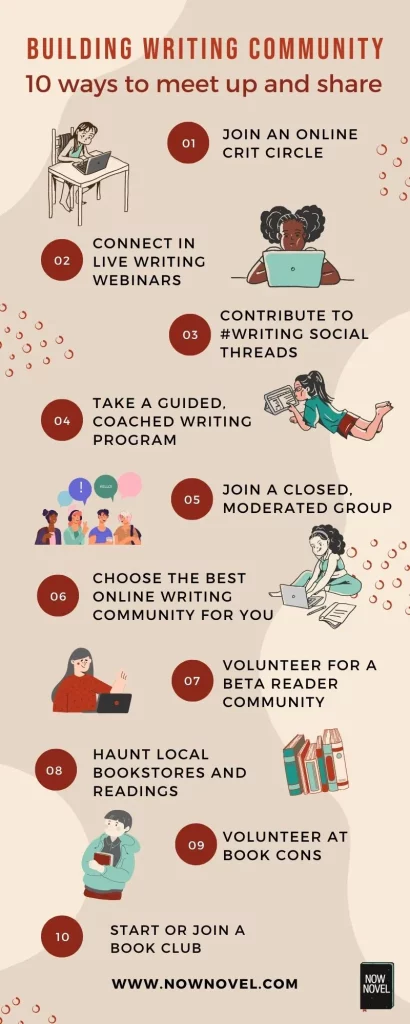Joining a writing community is good for your writing craft. Whether you meet other writers online or in person, it’s great for swapping ideas, critiques, and cementing your writing process while staying accountable. It adds a social side to what can otherwise feel a lonely process. Try these ten ways to meet other authors who share your love of words:
Build your writing community and:
- Join an online crit circle
- Connect in live webinars
- Contribute to #writingcommunity threads
- Take a guided, coached writing program
- Join a closed, moderated group
- Find the best online writing community for you
- Volunteer for a beta reader community
- Haunt local bookstores and readings
- Volunteer at book cons in your area
- Start or join a book club
Keep reading for guidelines for contributing meaningfully to a writing group, tips for making the most of social media writing communities and more.
Join an online crit circle
Critique or crit circles are excellent spaces to hone your story craft and build connections.
As a member of Now Novel’s own online community says, an effective writing group:
…fosters literary growth and offers motivation and support.
– Margriet, Now Novel review via TrustSpot
Choosing between online critique circles
There are many writing communities online to choose between. You may be familiar with:
- Now Novel (that’s us)
- Writers Helping Writers
- Scribophile
- Critique Circle
- Wattpad
- NanoWriMo
- Absolute Write Water Cooler
Which is the best writing community for you? It depends whether you want:
- Forums for discussion
- Feedback on writing in progress or finished drafts
- More of a social emphasis or want to focus on getting it done
- Live writing webinars and critique workshops
Some of the writing communities (including our own) offer story outlining tools, courses and other resources, too.
Others are private international Facebook groups (like Writers Helping Writers’ group started by Mike Geffner) that have specific rules for what you can and can’t post.
How to be an asset to your creative writing community
Any community is as effective as its members are willing to participate and help one another. Giving critique is a fantastic way to grow your craft (just ask top critiquers on Now Novel). To be an asset to your community:
- Word feedback clearly, keeping encouraging tone.
- Give us much as you take – if you want feedback, build relationships by giving quality writing feedback yourself.
- Bracket out or give caveats to anything that is personal opinion. You as reader may prefer X, but what will serve the other member’s writing or project best, given any aims they’ve shared?
- Keep it kind, compassionate, and remember the courage other members have summoned to contribute. Constructive feedback builds, says, ‘How about that?’ rather than tearing down.
Connect in live webinars
Communicating in forum posts is asynchronous. Some writers prefer this, but if you want live connection, writing webinars are often insightful and a great way to meet other wordsmiths.
Many authors host webinars to connect with fans, and our own novel writing coaches run webinars for premium members (and occasional free writing webinars, too).
To make the most of the next writing webinar you attend:
- Check upcoming writing topics or guest speakers in advance.
- Prepare a brief question for the Q&A section if there is one ahead of time so you can get your most pressing questions answered.
- Have a notebook at hand in case any ideas occur to you while the session is underway. You could just write down the time-stamp within the hour if the session is being recorded and will be available later.
Contribute to #writingcommunity threads
Each social media platform has hashtags social writing communities use to share things such as questions, publishing news, or simply the joys and frustrations of storytelling.
The hashtag #writingcommunity on Instagram, for example, has 12.7 million posts at time of writing (trending at time of writing are posts such as ‘Tips for Writing Fight Scenes’, ‘The Importance of Character Arcs’ and similar).
Follow the hashtags on social that feature the kind of information or community you’re interested in.
For example, if you are nearing publication, then #bookpromo and similar hashtags combining ‘books’ and ‘promotion’ (and their abbreviations and synonyms) would be worth following.
See how other authors are promoting their work (and jump in on conversations meaningfully where possible).
Tips for getting more out of social writing communities
To build your writing community on social media meaningfully, remember:
- Social media is a conversation, not a monologue. Don’t be afraid to engage with kindness, wit, insight, relevance on other people’s posts.
- Always read the room (are there identity politics involved where you may put a foot wrong? This is where it may pay to listen more than speak, or affirm and encourage more than debate).
- Ensure you are following and engaging with social communities relevant to your present writing needs and process. Whittle down what’s in your feed by things like your genre, target readership demographics, etc. (but it may give insight listening and learning outside your lane, too).
Take a guided, coached writing program
A peer-led writing community is one option, but if you want something more moderated, a coach-led writing program or course is helpful for structure and extra pro guidance.
When a group is helmed by a professional writing educator your community experience will typically include:
- Professional feedback
- Elements of structured learning (in addition to free-form discussion)
- Industry experience informing advice and suggestions – authority, in a nutshell
One of the advantages of paid writing communities over free ones is that you’ll meet other authors who are willing to invest in their craft because they take writing seriously – it’s a passion, but also a process with an end-goal in mind.
Many of Now Novel’s Group Coaching members have already completed prior manuscripts or have specific publishing goals in mind and many alumni go on to query agents and join our extended program for further writing support at their own, preferred pace.

Prepare to launch your book
Join a course led by multi-published authors
and learn how to publish and promote your book.
Join a closed, moderated group
Many authors considering joining online writing groups ask us a combination of the following questions:
- What if my work/idea is stolen?
- Do you or I keep copyright?
- What if other members are harsh or unkind?
Idea theft at the draft stage is extremely uncommon. You will find most cases of plagiarism are between writers whose work is already published. If you think about all the stories a person could plunder from, why wouldn’t they pilfer ideas from a story that has already proven marketability?
If you are worried about sharing in a writing community, a closed community such as a Facebook group or the members-only groups for Now Novel’s courses offers a more intimate, vetted and monitored space to meet other writers.
Be wary, too, of any writing community or publishing platform that makes you sign publishing rights over or demands exclusivity.
In proper publishing, money flows from the reader to the author, not their writing community. Writing services may assist you in getting to the point of publication, but no writing service company should require total or lasting creative rights to your work.
If you have once been bitten by hostile writing communities before and are twice shy, it may simply have been the wrong fit. A good community will uphold standards regarding communication and an ethics of care and caution or remove members who do not uphold the writing community’s standards of conduct.
Find the best online writing community for you
What is the best online writing community? It depends on what you need. Is it rigorous critique? Discussion and guidance relevant to your genre or subgenre? A platform for co-promoting forthcoming publications?
Many of the best writing websites on the web also have robust comment sections and other resources where you’ll find extra writing advice and rapport.
Volunteer for a beta reader community
Reading is such a crucial part of the writing process – that includes finding first readers to give you honest, detailed feedback on your final draft to help you revise.
There are many places to meet fellow writers and swap reading services, including:
- Now Novel’s free beta reader network – apply to join here
- Beta-reader forums on sites such as Goodreads
- Moderated Facebook groups linking up authors at the beta-reading stage
You may be wary of giving just anyone your manuscript to read, understandably. You could share a read-only version (if you are fine with this disallowing in-line comments). Alternatively, spend some time in the community. You’ll get a sense over a month or two of who all seems trustworthy, honest, kind and fair.
Haunt local bookstores and readings
Since the digital shift, brick-and-mortar bookstores – the ones that have not closed down already – need your support more than ever.
Attending local readings and other events hosted by your local bookstores is a good way to get to meet other writers in person, and network, too.
You never know what doors might open in the process, plus it’s great to support your local writing and author-benefitting community.
Volunteer at local book cons in your area
Book conferences and other industry events are fantastic opportunities not only to connect with others in the writing community but also to get valuable insights from professional authors, editors, agents and others.
Although many conferences moved online during the Covid-19 pandemic, in-person events have been able to continue more recently.
A Now Novel coaching alumna shared her positive experience of volunteering at a book con and the encouragement and support the experience provided – as experiences go, a win.
Start or join a book club
Holding monthly writing crit groups with friends who are passionate about storytelling is a valuable commitment to create and keep. It will help you to stay accountable and motivated.
Even a book club where you pool owned books with trusted friends is a great way to build community around writing and storytelling and inspire yourself to keep dreaming and imagining (and maybe get more adventurous in your reading, too). [Ed’s note: As a kid and teen, I read everything I could lay my hands on from literary to women’s fic thanks to the cardboard boxes that did the rounds in my parents’ book club].
Book clubs are also a great way to build an accessible, niche library and share your favorite books with your friends (and many smaller book stores and even larger chains offer book clubs special discounts).
Ready to connect? Join Now Novel for a constructive critique community and get pro feedback, webinars with coach Q&As and more when you upgrade.




